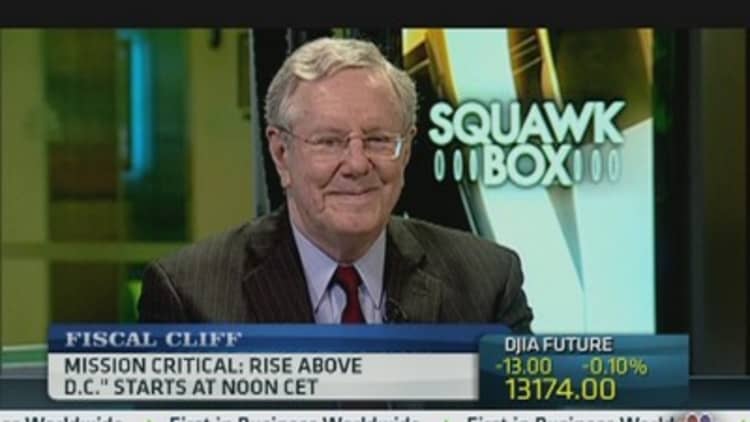The impending U.S. "fiscal cliff" that is causing uncertainty in global markets should not result in rushed reforms in the country's tax code, causing potential harm to the economic recovery, according to Steve Forbes, chairman and editor-in-chief at Forbes Media.
The stalemate continued on Monday after the White House and House of Representatives speaker John Boehner's office held more talks on the steep tax hikes and budget cuts that are to kick in next month. Neither the Republicans nor the Democrats have shown signs that they are willing to give any ground.
Forbes, a noted Republican, urged the party's lawmakers to not surrender to any tax increases that could harm the economy and instead prolong talks so that clearer and more assured reforms can take place.
"Right now the U.S. economy is wobbly, as are most economies in Europe and Japan," he told CNBC Tuesday. "For us to raise taxes now, especially on critical small businesses and capital creators, is just sheer foolishness. The timing couldn't be worse."
(Read More: Market Speculation Is a Bigger Threat Than 'Cliff': Bogle)
Forbes admits that the country is likely to "go over" the cliff but hopes that it will mean any decisions will not be pushed through without serious thought. Republicans should concede that the rich need to be taxed, he said, and instead should concentrate on fighting for pro-growth measures.

"The best way to increase revenue is not to increase taxes, as we see in Italy and other places, it's to make structural reforms to enable the economy to move again," he said. "Don't harm the patient. To do something short term that harms the economy is worse than doing nothing."
Meanwhile, Erskine Bowles, co-chair of President Barack Obama's 2010 debt commission, has stated that he believes there's a 40 percent chance that a deal would be reached before year end.
"The chances of getting it done are better and that's what's key," he told CNBC Monday.
(Read More: A '40% Chance' of Cliff Deal Before Year End: Bowles)
However, he gave the possibility of a negative outcome only slightly lower at 35 percent, which would trigger the $600 billion in spending cuts and tax increases.
The most widely discussed solution is a tax increase on high earners favored by the Democrats in exchange for concessions that would lead to reduced Medicare costs. However, reports show that a deal is far from being reached.

